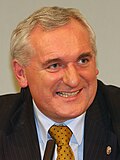This article needs additional citations for verification .(October 2018) |
| |||||||||||||||||||||||||||||||||||||||||||||||||||||||||||||||||||||||||||||||||||||||||||||||||||||
13 seats to the European Parliament | |||||||||||||||||||||||||||||||||||||||||||||||||||||||||||||||||||||||||||||||||||||||||||||||||||||
|---|---|---|---|---|---|---|---|---|---|---|---|---|---|---|---|---|---|---|---|---|---|---|---|---|---|---|---|---|---|---|---|---|---|---|---|---|---|---|---|---|---|---|---|---|---|---|---|---|---|---|---|---|---|---|---|---|---|---|---|---|---|---|---|---|---|---|---|---|---|---|---|---|---|---|---|---|---|---|---|---|---|---|---|---|---|---|---|---|---|---|---|---|---|---|---|---|---|---|---|---|---|
| Turnout | 1,841,335 (59.0% | ||||||||||||||||||||||||||||||||||||||||||||||||||||||||||||||||||||||||||||||||||||||||||||||||||||
| |||||||||||||||||||||||||||||||||||||||||||||||||||||||||||||||||||||||||||||||||||||||||||||||||||||
 Colours indicate winning party. | |||||||||||||||||||||||||||||||||||||||||||||||||||||||||||||||||||||||||||||||||||||||||||||||||||||
| Members of the European Parliament for Ireland | ||||||||||||||||||||||||||
| ||||||||||||||||||||||||||
| Women | ||||||||||||||||||||||||||
The 2004 European Parliament election in Ireland was the Irish component of the 2004 European Parliament election. The voting was held on Friday, 11 June 2004. The election coincided with the 2004 local elections. The election was conducted under the single transferable vote.
Contents
This was the first election that Fine Gael won more seats than Fianna Fáil, who had won most seats at every election from 1979.






